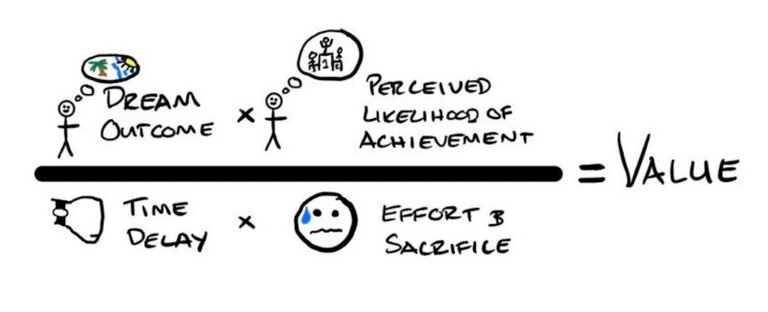What’s the Right Price for Coaching? Understanding Value vs. Cost
Determining the right price for coaching can be tricky. Many people focus on the cost without fully understanding the value that coaching brings. In this article, let’s explore the key factor in determining price—the value-to-cost ratio.
What Are You Really Paying for in Coaching?
Contrary to popular belief, you’re not paying for a coach’s time—you’re paying for the results they deliver. A coach's value lies in their ability to help you achieve your desired outcome quickly and effectively.
A useful framework to understand this is Alex Hormozi’s Value Equation:

Value = Dream Outcome × Perceived Likelihood of Success / Time & Effort Required
This means that the clearer your dream outcome and the more likely a coach is to help you reach it, the more valuable the service becomes. If a coach can help you achieve your goals quickly while minimizing your effort, that increases their value.
Let’s break down each component:
- Dream Outcome: It's crucial for both you and the coach to clearly define the desired outcome upfront. The clearer the goal, the more focused the coaching.
- Perceived Likelihood: If a coach has successfully delivered results for many clients in similar situations, they are more likely to do the same for you, which justifies a higher price.
- Time Involved: The faster a coach can get you to your dream outcome, the more valuable their service becomes.
- Effort or Sacrifice: While achieving results will always require some effort, a coach who helps you avoid costly mistakes and reduces your learning curve increases their value.
Examples:
- Business Coaching: A business coach who helps you launch your service in six months offers more value than one who provides general advice over the same period without a clear outcome.
- Health Coaching: A health coach who helps you develop lasting healthy habits and achieve weight loss in three months is more valuable than a personal trainer who works with you for a year without visible progress due to a lack of clear metrics.
How Do You Determine the Value of the Problem You're Solving?
- In business coaching, the value can often be more tangible, like increasing revenue or launching a product.
- In other areas like life coaching, the value is determined by how impactful the solution is. For example, improving mental focus, performance, productivity or saving relationships can be incredibly valuable depending on the context.
Additional Aspects of Value
Value in coaching isn’t just about immediate results; it’s about the lasting impact and the long-term benefits that follow the initial outcome. Here are some examples:
- Business Coaching: Successfully launching a product could result in sustained revenue growth.
- Health Coaching: Achieving weight loss or fitness goals can improve long-term health and reduce medical expenses.
- Life Coaching: Gaining clarity in life purpose can create long-term fulfillment and enhance personal relationships.
- Sports Coaching: Winning a competition might lead to future sponsorships or media exposure.
What Is the Right Cost for You?
The cost of coaching depends on how much you’re willing and able to pay to solve your problem relative to the value of the solution. A general rule of thumb is that the cost should be about 10% of the total value you’ll receive, but, of course, it varies.
How Coaches Set Their Price
Coaches determine their prices based on the following factors:
- Value of the Problem: The more valuable the problem they’re solving, the higher the price.
- Predictability of Results: Coaches who consistently achieve results can charge more because they deliver more value.
- Confidence: A coach's confidence in their ability to deliver drives the price they set.
- Client Market: The financial capacity of the clients they serve also influences pricing.
The cost of coaching isn’t about hourly rates—it’s about the coach’s ability to predictably deliver results. The more reliably a coach can help you achieve your goals, the higher their price will be.
Here are some examples:
- A health coach who helps you lose weight or reduce cholesterol in three months commands a higher price because they deliver life-changing results efficiently.
- A business coach with a proven track record of scaling businesses quickly can justify a higher fee because they reduce uncertainty and risk for the client.
Common Misconception: Low Budgets and Unrealistic Expectations
A frequent issue in the coaching industry is clients expecting high-quality, long-term coaching for low prices. This often leads to disappointing results.
For example, If you expect a business coach to develop a full marketing strategy and coach you for months on a $500 budget, the quality of work will likely be poor. Meaningful, long-lasting results require an appropriate investment.
Summary
Coaching is an investment in your future success. The right coach brings measurable value by helping you achieve your goals quickly and efficiently. When considering the price of coaching, focus on the value and results you’ll gain, not just the cost. By understanding the true worth of coaching, you can make informed decisions and experience lasting success.
Checklist Before Hiring a Coach
- What issue am I solving?
- What dream outcome am I chasing?
- How big is the gap between where I am and where I want to be?
- How much time do I have to solve this?
- What would an ideal coach for me look like?
Here is a more detailed guide How to Hire a Coach: A Step-by-Step Guide






